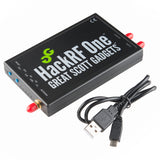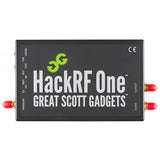Warning: The HackRF One is a research tool and test equipment for RF systems. It is NOT a consumer-level product and has NOT been certified for consumer or commercial use. You are responsible for using the HackRF One legally according to RF transmission and signal processing regulations.
This is the HackRF One, a Software Defined Radio (SDR) peripheral capable of transmission or reception of radio signals from 1MHz to 6GHz. Designed to enable the testing and development of modern and next-generation radio technologies, HackRF One is an open-source hardware platform that can be used as a USB peripheral or programmed for stand-alone operation.
If you are wondering what an SDR is, it's OK we can help. A Software Defined Radio is essentially a radio communication device that implements the use of software instead of the typically implemented hardware (these would include mixers, amps, and modulators for example). SDR is the application of Digital Signal Processing to radio waveforms. It is similar to the software-based digital audio techniques that became popular a couple of decades ago. Just as a sound card in a computer digitizes audio waveforms, a software radio peripheral digitizes radio waveforms. It's like a very fast sound card with the speaker and microphone replaced by an antenna. The HackRF One acts in just this way, an all-in-one SDR in a small enclosure a little bigger than a cell phone.
Every HackRF One is protected by an injection moulded plastic enclosure and ships with a micro USB cable.
Note: An antenna is not included. We recommend the ANT500 Telescopic Antenna as a starter for the HackRF One. An alternative is the shorter ANT700 Telescopic Antenna.
INCLUDES
FEATURES
- 1 MHz to 6 GHz operating frequency
- Half-duplex transceiver
- Up to 20 million samples per second
- 8-bit quadrature samples (8-bit I and 8-bit Q)
- Compatible with GNU Radio, SDR#, and more
- Software-configurable RX and TX gain and baseband filter
- Software-controlled antenna port power (50 mA at 3.3 V)
- SMA female antenna connector
- SMA female clock input and output for synchronization
- Convenient buttons for programming
- Internal pin headers for expansion
- Hi-Speed USB 2.0
- USB-powered
- Open-source hardware
DOCUMENTS









